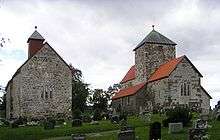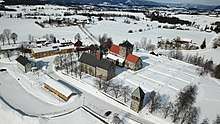Sister Churches, Norway
The Sister Churches (Norwegian: Søsterkirkene) consist of two late 12th-century churches built side by side at the village of Granavollen in Gran in Innlandet county, Norway. [1]



Nikolaikirken to the right
History
According to local folklore, the churches were commissioned by two sisters who had fallen out and therefore would not be seen in the same church. It is, however, not uncommon for medieval churches with different functions to be built close to one another. [2]
Nikolaikirken
The larger of the churches is called Nikolaikirken (St. Nicholas Church). This church probably acted as a church for Hadeland rural parish and can seat around 250 people. Because of later rebuilding it is difficult to establish an exact date of construction. Based on stylistic evidence, however, it is thought that the church was built sometime between 1150 and 1200. The church is built as a basilica church with solid Roman columns and plastered walls. Much of the original interior has been lost in fires and in subsequent rebuilding. More disappeared from the church during the modernization of the 1860s. Originally, the tower had a high spire, but it disappeared by a fire in 1799. The choir was changed by development in the 13th century.
Mariakirken
The smaller of the churches is Mariakirken (St. Mary Church), a single nave church, which either acted as a monastic church or a church for the local Gran parish. It was built sometime before 1150, and contains Romanesque and Gothic elements. A fire in 1813 gutted the church and it was not rebuilt until 1859. Until recently it was used as a chapel, but is now open for normal services. It can seat around 150 people. The church was restored in 1912-15 and in 1990-92.
Churchyard
In the south-eastern part of the churchyard there is a medieval stone tower, Klokketårnet, the original function of which is unknown. It is possible that the tower, which from the mid-19th century was used as a bell-tower, was originally used as a defence tower or refuge. The 11th century Granavollen Runestone can be found behind Nikolaikirken.
The towers of the Søsterkirkene form the base coat of arms to Gran municipality. Noted poet and journalist, Aasmund Olafsson Vinje, is buried in the cemetery of Søsterkirkene. A monument with a bust of Vinjes by sculptor Brynjulf Bergslien was erected at the site.
 Granavollen Runestone outside Søsterkirkene
Granavollen Runestone outside Søsterkirkene Medieval stone tower by Søsterkirkene
Medieval stone tower by Søsterkirkene Nikolaikirken at Gran
Nikolaikirken at Gran Mariakirken at Gran
Mariakirken at Gran
References
- Søsterkirkene på Granavollen (Norske Kirkebygg)
- "Church History". granavolden.no. Retrieved September 1, 2018.
- "Søsterkirkene - A landmark". Destinations in Oppland. Retrieved September 1, 2018.
- "Søsterkirkene (Gran)". pilegrimsleden.no. Retrieved September 1, 2018.
External links
- Sister churches picture gallery at Remains.se
| Wikimedia Commons has media related to Sister churches at Gran, Oppland. |